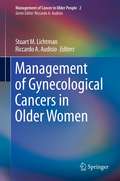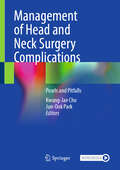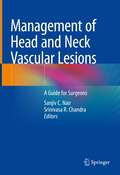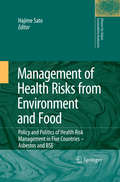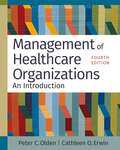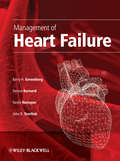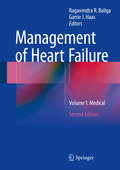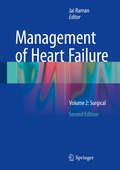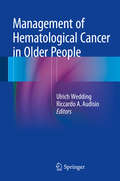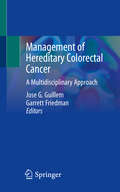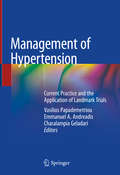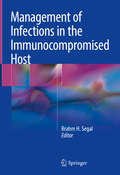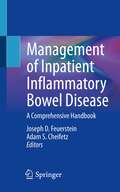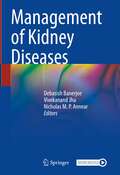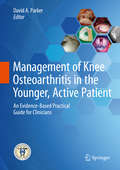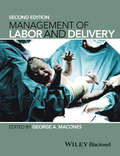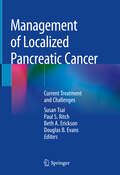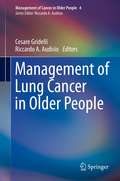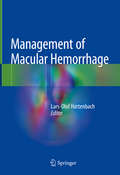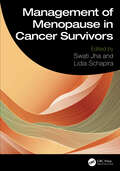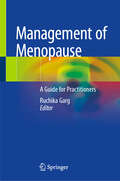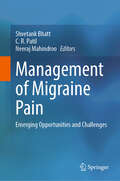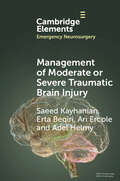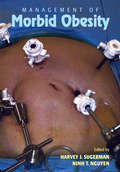- Table View
- List View
Management of Gynecological Cancers in Older Women
by Riccardo A. Audisio Stuart M. LichtmanThis book aims to provide an up-to-date review of the literature in each of the major areas relating to the management of older gynecological cancer patients, and makes recommendations for best practice and future research. The authors come from a broad geographic spread including the UK, mainland Europe and North America to ensure a worldwide relevance.
Management of Head and Neck Surgery Complications: Pearls and Pitfalls
by Kwang-Jae Cho Jun-Ook ParkHead and neck anatomy is a complex area and densely populated by critical structures. Surgical complications after head and neck surgery are associated with significant morbidity and may even be fatal. Thus, a surgeon‘s knowledge of surgical complications is essential for successful outcome. This book provides a comprehensive guide to manage complications after head and neck surgery. It consists of pearl and pitfalls of experienced surgeons, evidence-based information and full-coloured photographs for managing possible complications after head and neck surgery. With the illustrative figures, This book will be a practical reference for otolaryngologists, head and neck surgeons, professional clinical staff, and medical students.
Management of Head and Neck Vascular Lesions: A Guide for Surgeons
by Sanjiv C. Nair Srinivasa R. ChandraThis book provides a simple, step-by-step guide to the identification and sequential management of vascular lesions in the body. Since most vascular lesions occur in the head and neck area, the surgical interventions present challenges with regard to facial growth, airway management and reconstruction options. This book explores the treatment of head and neck vascular malformations and tumors from the perspectives of various specialties, such as otolaryngology, and pediatric, maxillofacial and plastic surgery. It covers surgical anatomy, pathophysiology, molecular basis, medical treatment, current embolization guidelines and surgical resection and reconstruction options for each type of tumor. It also discusses interventional and diagnostic radiological techniques. Written by leading international specialists, the book is a valuable resource for craniofacial, pediatric, maxillofacial, head and neck, and plastic surgeons as well as pediatricians and otolaryngologists.
Management of Health Risks from Environment and Food
by Hajime SatoThis book examines the policy and politics of two health risks, which have recently become prominent social issues in many countries. One is the issue of asbestos as an environmental risk to humans, and another is that of bovine spongiform encephalitis (BSE), or mad cow disease as an animal disease, and of its variant Creutzfeldt-Jakob disease (CJD) as a human food risk. Employing a set of analytical frameworks in political science, each case study explores how the issues emerged, agendas got set, alternatives were chosen, and policies were implemented. Through the analysis, it is examined how safety and public reassurance were pursued in the countries studied (Japan, the UK, France the USA, and Korea). Exploration of the successes and failures in their efforts discloses the key elements to successful health risk management.
Management of Healthcare Organizations: An Introduction
by Peter C. Olden Cathleen O. ErwinTo become a successful healthcare manager, students need to understand management theories and methods and know how to apply them to real-world problems. Management of Healthcare Organizations: An Introduction teaches this in an engaging way. The authors provide aspiring managers with theoretical background, practical methods, and hands-on exercises to prepare for careers in healthcare management, emphasizing the multifaceted nature of management problems and the need to combine a variety of approaches to solve them. <p><p>This text includes bulleted lists, examples, and exhibits to boost readability, retention, and engagement. Chapters are arranged to sequentially build a body of knowledge and a mental framework for management. Each chapter begins with a scenario taken from the same complex telehealth case study, reinforcing the complexity of management problems while introducing chapter concepts. Each chapter has updated information on diversity, equity, and inclusion, and strategies for managing clinical staff and performance, as well as “Try It, Apply It” real-world exercises. This book combines time-tested fundamental principles with cutting-edge methods and current knowledge.
Management of Heart Failure
by Sanjiv Narayan John Teerlink Barry Greenberg Denise BarnardThis volume presents a fresh international perspective on current approaches to treating heart failure. An accessible reference for hospital-based specialists, the book provides an update on recent advances in therapeutics and pharmacology, as well as ongoing trials. Four major sections concentrate on a review of screening, assessment and diagnosis; an update on drug treatments; an update on device therapy; and a description of best practice recommendations for managing clinically challenging cases
Management of Heart Failure
by Ragavendra R. Baliga Garrie J. HaasThis new edition of Medical Management of Heart Failure will provide the full spectrum of medical options, ICU management and rehabilitation, while also prepare the reader for the second volume of Comprehensive Management of Heart Failure by introducing the surgical options in heart failure from transplant to the more noninvasive procedures in the interventional radiology department. The contributing authors are all key opinion leaders in the medical management of heart failure. This volume is designed to integrate with its sister surgery title, but also alone be the definitive guide to the medical management of heart failure.
Management of Heart Failure
by Jai RamanSurgical Management of Heart Failure brings together the current knowledge on the surgical management of heart failure into one volume. It is designed to have copious illustrations and photographic material that will explain the techniques and surgical management of patients with heart failure in an effective modern format.
Management of Hematological Cancer in Older People
by Riccardo A. Audisio Ulrich WeddingThe risk of cancer increases with age, and the number of older adults seeking treatment is increasing dramatically in line with the aging population. The care of older patients differs from that of younger adults because of differences in the biology of the tumor, age-related differences in host physiology, co-morbidity burden and psychosocial issues, which might impact the efficacy and side effects of cancer therapy. This book focuses on the management of hematological cancer and provides guidance on the management issues specific to older patients, spanning background and epidemiology, special considerations in the management of older people, therapeutics and psychosocial considerations.
Management of Hereditary Colorectal Cancer: A Multidisciplinary Approach
by Jose G. Guillem Garrett FriedmanThis book provides a comprehensive review of the clinical management of hereditary colorectal cancer. The text focuses on six distinct patient groups: patients with elderly age-of-onset colorectal cancer and adenomas, patients with hamartomatous colorectal polyps, patients afflicted with familial adenomatous polyposis (FAP), patients with attenuated familial adenomatous polyposis (AFAP), patients with MYH associated polyposis (MAP), and patients afflicted with lynch syndrome (LS). Each chapter illustrates how clinicians utilize current technologies in genetic testing, pathological review, and endoscopic, surgical, and chemotherapeutic/immunotherapeutic approaches to manage these patient groups. Topics such as the timing of genetic testing, endoscopic screening and surveillance, prophylactic surgical options and chemo-preventive interventions are also discussed in concise yet precise detail. Written by experts in their fields, Management of Hereditary Colorectal Cancer: A Multidisciplinary Approach is a valuable and timely resource for gastroenterologists, surgeons, genetic counselors, medical oncologists, psychologists, and any health caregivers involved with the management of patients and families afflicted with a hereditary form of colorectal cancer.
Management of Hypertension: Current Practice and the Application of Landmark Trials
by Emmanuel A. Andreadis Vasilios Papademetriou Charalampia GeladariThis book is a valuable tool to assist both cardiovascular physicians and scientists learning the intricacies of hypertension research and its milestone studies. All major hypertension trials have been reviewed in this book in chronological order with extensive discussion of the study population, study design, and outcomes and with a special focus on what knowledge they offered, their strengths and weaknesses, statistical errors, impact on international guidelines and unmet needs. Importantly, the book also offers physicians and young scientists with basic knowledge regarding medical biostatistics. It is of critical importance for a scientist involved in the field to understand deeply the process of analyzing medical data. Moreover, the accurate interpretation of the results is central for applying evidence-based medicine in everyday clinical practice. Management of Hypertension: Current Practice and the Application of Landmark Trials is a critical tool to assist in the education of physicians and researchers in the field, providing a separate section on pioneer researchers in hypertension and urging readers to become bright exemplars for scientists wishing to pursue a career in academic medicine and hypertension research.
Management of Infections in the Immunocompromised Host
by Brahm H. SegalThis book provides a comprehensive, state-of-the-art review of the concepts vital to a modern treatment of common and opportunistic infections in the immunocompromised host. Chapters are written by experts in the field, and include their views on gaps in the field and future directions of research. This book begins with an overview of the normally functioning immune system followed by a detailed discussion of the major primary immunodeficiencies. Specific chapters are dedicated to providing practical knowledge in the prevention and treatment of infections in specific immunocompromised patients, including those with cancer, transplant recipients, HIV infection, and autoimmune disorders. Emphasis is placed on diagnostic evaluation, antimicrobial selection that includes consideration of the threat of antimicrobial-resistant pathogens, and immunotherapy tailored to specific patients. Finally, dedicated chapters on stem cell transplantation for patients with primary immunodeficiencies, adoptive cellular immunotherapy, and gene therapy will provide readers with insight into these rapidly evolving and cutting edge therapies.Management of Infections in the Immunocompromised Host is a valuable resource for infectious diseases specialists, immunologists, oncologists, hematologists, general physicians, students, researchers, and all other working with immunocompromised patients.
Management of Infertility for the MRCOG and Beyond
by Siladitya Bhattacharya Mark HamiltonDemands on the gynaecologist from patients seeking help with suboptimal fertility continue to grow, and fertility-related issues are often in the gaze of the media. Obstetricians and gynaecologists need to ensure that they are up to date, informed and knowledgeable to successfully engage with their patients. Written by nationally recognised leaders in the field, this volume concisely reviews contemporary clinical practice. Using an aetiology-based approach, the evidence underpinning the management of ovulatory dysfunction, male infertility, endometriosis, tubal, uterine factor, and unexplained infertility is critically reviewed. The role of assisted reproduction treatment is elaborated and a new chapter describes the clinical and laboratory techniques involved. The book provides a comprehensive summary for candidates preparing for the Part 2 MRCOG examination, covering the RCOG curriculum for infertility management. It will be enormously helpful to health professionals working in fertility clinics and an essential aide-memoire to those undertaking special interest training in infertility.
Management of Inpatient Inflammatory Bowel Disease: A Comprehensive Handbook
by Adam S. Cheifetz Joseph D. FeuersteinThis handbook provides a concise, state-of-the-art overview on the management of inflammatory bowel disease (IBD) in the hospitalized patient. The book reviews epidemiology and risk factors for hospitalization in patients with ulcerative colitis (UC) and Crohn’s disease, as well as medical and surgical management strategies for patients hospitalized with UC or Crohn's disease. The book also highlights complex disease management cases involving co-infection from clostridium difficile and/or CMV. The volume also spotlights nutrition management, quality of care, and management of pediatric and pregnant patients hospitalized with IBD flares.
Management of Kidney Diseases
by Debasish Banerjee Vivekanand Jha Nicholas M. P. AnnearThis book provides an evidence based guide to the management of common kidney conditions. Concise and highly structured chapters outline a diagnosis and treatment framework for kidney diseases encountered within daily practice. Particular attention is given to the management of chronic kidney disease, genetic kidney diseases, cardiovascular complications, haemodialysis, kidney cancer, peritoneal dialysis, and kidney transplantation. Management of Kidney Disease aims to improve outcomes for patients with kidney diseases and is relevant to trainee and practising nephrologists, as well as healthcare professional treating kidney diseases.Additional questions and answers via app: Download the Springer Nature Flashcards app free of charge and use exclusive additional material to test your knowledge.
Management of Knee Osteoarthritis in the Younger, Active Patient
by David A. ParkerThis book is a rich source of practical guidance on the management of relatively young patients with osteoarthritis of the knee that will assist physicians and allied health professionals in enabling patients to remain active and sustain their quality of life. It provides up-to-date knowledge on the available treatment options, describes the evidence base for each option, and identifies the appropriate timing and indications. The book opens by considering the basic science behind osteoarthritis, which is critical to management. The many nonsurgical treatment modalities are then discussed, with particular focus on the importance of a multidisciplinary approach. Subsequent chapters address the role of surgical management, covering both techniques that attempt to preserve and possibly restore the native knee joint, such as meniscal and chondral surgery, arthroscopic debridement, and osteotomy for realignment of the joint, and those that involve joint replacement. The arthroplasty component of the text encompasses all areas of prosthetic resurfacing, including localized resurfacing, unicompartmental replacement, and total knee replacement. The book has been produced in cooperation with ISAKOS and the authors constitute an international faculty who provide a truly global perspective on the subject.
Management of Labor and Delivery
by George A. MaconesThe process of labor and delivery has been one of the most perilous activities in human life. The awkward evolutionary compromises giving rise to humans makes birthing potentially life threatening for both mother and child. Despite the development of modern care, labor and delivery continues to be a dangerous process even though the levels of fatality have decreased over the past several decades. This clinically focused guide to modern labor and delivery care covers low and high-risk situations, the approach of the team in achieving a successful outcome and what to consider when quick decisions have to be made. Aimed at both trainee and practicing obstetrician-gynecologists, this new edition includes practical guidance such as algorithms, protocols, and quick-reference summaries. It is squarely focused on the process of birth and concentrates on modern clinical concerns, blending science with clinical applications.
Management of Localized Pancreatic Cancer: Current Treatment and Challenges
by Douglas B. Evans Susan Tsai Paul S. Ritch Beth A. EricksonThis book is designed to present a comprehensive understanding for the rationale of neoadjuvant treatment sequencing for localized pancreatic cancer and to focus on accurate clinical staging and stage-specific treatment sequencing. Sections address important aspects of clinical management of localized pancreatic cancer from diagnosis to surgery. These areas include initial radiographic staging, management of obstructive jaundice, role of chemotherapy and chemoradiation in neoadjuvant therapy, assessment of treatment response, and operative considerations for complex vascular resections. A brief review of suggested readings addressing the particular topic follows in each section, as well as a summary of clinical “pearls”. Management of Localized Pancreatic Cancer: Current Treatment and Challenges provides a comprehensive resource which clearly defines the principles of neoadjuvant therapy as well as a clinical framework for successful therapy. It serves as a valuable guide to physicians of multiple disciplines who are interested in utilizing neoadjuvant therapy for localized pancreatic cancer.
Management of Lung Cancer in Older People
by Cesare Gridelli Riccardo A AudisioThis book aims to provide an up-to-date review of the literature in each of the major areas relating to the management of older lung cancer patients, and makes recommendations for best practice and future research. The authors come from a broad geographic spread including the UK, mainland Europe and North America to ensure a worldwide relevance.
Management of Macular Hemorrhage
by Lars-Olof HattenbachSub- or preretinal hemorrhage involving the macula is a typical complication in a variety of ocular diseases, including age-related macular degeneration, arterial macroaneurysm, Valsalva retinopathy, and trauma. However, there is currently no consensus regarding the ideal treatment for macular hemorrhage. The purpose of this book on macular hemorrhage is twofold: it aims both to impart valuable information on pathophysiology, risk factors, diagnostic aspects, and prognostic criteria under different conditions and to provide a systematic overview of therapeutic approaches that cover the most important situations a vitreoretinal surgeon might encounter when treating patients with this disorder. Case presentations, clinical photographs, and an extensive review of the literature supplement the important information on clinical decision making, surgical techniques, and typical pitfalls and invite the reader to explore the advantages and disadvantages of various approaches to the management of macular hemorrhage.
Management of Menopause in Cancer Survivors
by Swati Jha Lidia SchapiraAs perceptions of menopause have evolved, this new text examines what clinical problems can arise in treatment of patients experiencing menopause after cancer treatment. For too long, menopausal symptoms have been undertreated in cancer survivors, leading to suffering and suboptimal health outcomes. From hot flashes to night sweats to mood and sexual concerns, this book provides practical tips for approaching these symptoms in the clinic. It will be an invaluable reference for both gynaecologists and oncologists internationally.
Management of Menopause: A Guide for Practitioners
by Ruchika GargThe book covers all aspects of menopause, from the physiology of menopause to all the associated health risks. It provides concise and easy-to-understand literature. It includes algorithms and tables to help in a deeper understanding of the subject. The book covers the latest evidence on hormone therapy describing its risks and benefits. It discusses the effect of menopause on bone health and breast cancer and the latest research studies related to it at length. It deliberates lifestyle interventions that can help manage menopausal symptoms and reduce health risks, including diet, exercise, stress reduction, and complementary therapies such as acupuncture. In addition, it describes sexual health, psychological issues, and bone health at menopause. Chapters include recent scientific studies and guidelines.The book is a useful reference for consultants, menopause practitioners, healthcare providers, graduate students, residents and trainees.
Management of Migraine Pain: Emerging Opportunities and Challenges
by Shvetank Bhatt C. R. Patil Neeraj MahindrooThe book delves into the multifaceted world of migraine pain, offering a profound understanding of its underlying pathophysiology and presenting established treatment strategies for its effective management. It discusses the intricate world of migraine pain, offering valuable insights into its diverse aspects. Starting with an exploration of migraine's epidemiology and etiology and the complex factors contributing to this debilitating headache disorder. This book explores the significance of lifestyle changes and offers practical strategies for incorporation. Furthermore, the impact of diet and nutrients on migraine management is extensively covered, shedding light on their role in alleviating symptoms. This book serves as a comprehensive guide, blending scientific insights with practical approaches, making it an indispensable resource for healthcare professionals, researchers, and individuals seeking a deeper understanding of migraine pain. By addressing both established practices and cutting-edge advancements, it bridges the gap between knowledge and effective management, offering a holistic perspective on this challenging condition.
Management of Moderate or Severe Traumatic Brain Injury (Elements in Emergency Neurosurgery)
by Adel Helmy Saeed Kayhanian Erta Beqiri Ari ErcoleThe management of patients with moderate and severe traumatic brain injury (TBI) is centred on the intensive care management to limit the extent of secondary injury to the brain, following the primary trauma. This management aims to optimise the homeostatic environment of the brain after injury and can be guided by multi-modality monitoring, including intracranial pressure (ICP) monitoring. This management often follows a tiered approach to introducing more aggressive interventions to correct physiology, based on evidence for ongoing secondary injury, such as raised ICP. The balance between risk and benefit for these interventions for individual patients is difficult, particularly in the absence of high quality randomised trials for many interventions in this area. In this Element, the authors outline both the approach to intensive care management of moderate and severe TBI, as well as the evidence base available for the interventions discussed.
Management of Morbid Obesity
by Ninh T. Nguyen Harvey J. SugermanEdited by world-renowned bariatric surgeons, this comprehensive reference provides a clear overview of multidisciplinary approaches to bariatric surgery and clearly details the techniques and outcomes of commonly performed bariatric operations, potential complications associated with bariatric surgery, and practices in long-term follow-up and nutri
